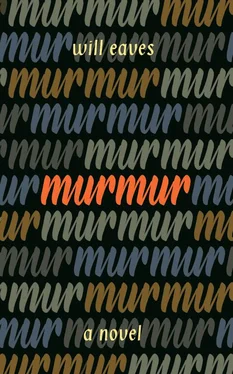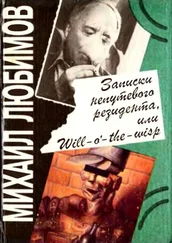He puts it on.
Molyneaux rolls over to see a creature in the doorway of the summerhouse. Behind it stirs the morning mist, to which the creature’s breath patiently adds, and behind that a boat greeting the island’s little stage—the stage the two boys missed last night.
Appalled voices. The creature flinches at the sound. Its chimerical head jerks five degrees, returns to gaze at Molyneaux as all around them trees explode with donnish crows and exclamations from the shore.
A step farther inside the house. The creature bows its head to Molyneaux’s shy hand, offers itself. Its skin is rough, a blanket-hide, its scent the tea of wintered leaves, its eyes deep-set and warm.
“And she was miles from anywhere in Indochina, in the hills. Not even there …”
The woman with the Colonel wears a matron’s uniform. Their clothes, put on in haste, look tight, uncomfortable. “Are these things yours?”
It’s an irrelevant question, like asking, “And what sort of time do you call this?” Into the answering silence pours the questioner’s self-doubt, his powerless pride. Stallbrook’s mouth overworks, wet with dismay. He nods toward Matron, who holds the dressing gowns and shoes. “I know—” he starts. “Good God, Pryor, this little escapade—have you no care? Did you not think what it might do? Your father, he and I… ought we to be ashamed of you?”
“My father’s dead.”
“Day he was born…” Matron whispers. (He has turned out exactly as she thought he would. Just look at him! See how the boy has wrapped himself in standard issue, like those poor souls in the newspaper! But he is touched, whatever Colonel Stallbrook says. Who could forget the way he came to Wargrave, on the first day of the General Strike, on foot, without a change of clothes? “I am Pryor. I ran from Southampton.” And what is that the little monster has upon his head? Who does he think he is?)
“Who do you think you are?”
“ I am the Red Lady of Paviland .”
“He has gone mad.”
“Put these back on at once.” Stallbrook advances, throws the dressing gowns and pullovers at Pryor’s feet, and points, enraged, at the wide door and cracked window. “Trespass. Breaking and entering.” His arm outstretched, his brow sweating. “You’ve no idea, the fix you’re in.”
The adolescent shaman doesn’t budge an inch. A stillness holds them all, a pause before the sun appears. Without a class of witnesses, without the rows of small believers with their small beliefs, the master and his pinafored attendant are like empty postboxes, waiting for purposes to visit them.
The other boy, Molyneaux, where is he? The thought occurs to Stallbrook as the morning sun strikes through the island’s poplars, lights the raspberry canes and apple trees, the Bath stone of the squat pavilion, its gray interior.
As if he hadn’t heard a thing, or understood or cared, Christopher Molyneaux lies back, one arm behind his head. He’s gathering his strength. A different kind of silence enfolds him. He knows that punishment awaits, though beyond that he cannot know, only dimly suspect. For now he rests, an incommunicable warmth supporting him. He coughs, arches his back, casts off the blankets Pryor spread last night upon the bed. His other hand drifts over his belly and down, pushing the wool farther away, idling. There is about his self-examination and arousal something suddenly fearless, a little menacing, and true.
When I look back, out of my struck portal, at Pryor, half-incorporated with the skull, the sun is both brighter and differently hued.
It passes overhead, swiftly. Night falls. Another sun rises and sets. Its arc across the sky pivots, days shudder into weeks and months. Colonel Stallbrook and his helpmate dwindle; they’re blurred by age and pulsing skies, the lantern-flicker of advancing years. With a wild look, as if at last conceding something known but never said or confronted, they see reflected in the shaman’s eyeless abstraction of self the confirmation of their loss: fan-deltaic wrinkles, white hair shriveling, the skin sucked back, a humbling that now accelerates. Stark, for perhaps one full second, two skeletons—their jaws unhinged, their bones dancing slowly apart—illuminate the onset of a longer night. The lake freezes. Ice calls to ice and Pryor’s raised and summoning hand is frosted black.
No trees, no distant school, a greenstick whine as cities pop, scatter. Another order of significance arrives. Air thickens with the charge of glaciers. The former gas solidifies, the mirror plane of my glass eye is crushed, and I am fractioned, like a mote among the asteroids. Only the world’s ship-like trembling, its great pistons concealed, attests the passage of eons, time brakeless and unpeopled. Then, as fast as they arrived, faster, the glaciers recede, the waters rise, anoxic bile that boils away at Pryor’s still, unvoiced command—and I am either glass again, or obsidian, axe flint, my face upturned and refashioned.
The veil of night draws back. The sun comes close, colossal in the sky. A pale hand hangs me on a wall that rises from the desert’s fiery sands.
*
Other wan shadows brush the lens clear of disaster and I find I’m in a room from which new, old, and reassuring forms emerge—the shelves of books, the desk, the built-in cupboard, and the bed.
The man upon the bed, gripping the herringbone coverlet holed by moths, the man bald but alive, amazed by his survival into planetary old age, is familiar. It is Alec. Or it is Molyneaux. Or both. It is a thing that needs a name.
The room’s not as it was before; the sequence of imagining has been altered, even—infinitesimally—the stirring in the drapes.
He lifts the glass of water by his bed and I am cast upon its surface as he drinks, close to the terror of his eye, the nostrils and the yellow skin, the chattering teeth, the white pill on his tongue.
But when he sets the glass down and I’m back in the mirror, I see an apple wobble into existence beside the glass, on a saucer. He picks it up, approaches me, and holds it up, offering the fruit of Deauville and the garden of mortality. “And sir,” he says, the voice remote, radio distressed, like something dialed, “what if you could really come back, be here in the future, knowing it, much more than if you’d merely conjured an image or cast the runes?”
He bites into the flesh of Malus pumila . His eyes roll up. Pale presences flush out from every wall to catch him as he falls. White violet skinny claws, warty and hand-painted. An eye, a cloak, a tremolo of creeps: cartoons, the imps and gristly disjecta of Disney, Bosch; a swarming substrate with a will.
Again the voice crackles across the years. It is the witch who calls him now, who calls through him to me. O! Dip the apple in the brew / Let the sleeping death seep through! / Dip the apple in…
My God, I’m holding it. The apple’s real. Green one side, red the other, heavy, bitter as a quince. The stars outside the room! They’re clustering. A shining host—
I’m breathing hard; the knowledge that this is me breathing makes my heart gallop. It is my heart, my breath. I’m being held—held down, and looking up. I’ve stopped breathing. My mouth is full. My heart has stopped. A hand closes—is this a hand I know? Has it a face? A hand closes the eyelids in my face.
*
Dear June,
Dr. Anthony Stallbrook, my pleasant Jungian (v.s.), quite surprised me the other day. I told him I was growing breasts and he dropped his notebook and said in a low voice that it was no doubt unprofessional of him to say anything but that he “found all of this personally disgusting.” I assumed he meant not just the breasts, but my whole predicament, sexual relations with men, etc.—and I was prepared to be disappointed in him, because he is an intelligent person—but not a bit of it. He said that it was the punitive measures he found disgusting, that they were an overcompensation (his word) and that he regarded me, very neutrally, as a “natural homosexual.” “As opposed to a mechanical one,” I replied, and he laughed: “I thought you were going to say ‘unnatural.’” And then he stumped me. “Is sex mechanical, Alec, for you?”
Читать дальше












